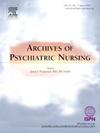Unexpected deaths within psychiatric setting: A scoping review
IF 2.2
4区 医学
Q1 NURSING
引用次数: 0
Abstract
Background
Unexpected deaths have been associated with a variety of factors within the inpatient psychiatric setting.
Aims
This scoping review aims to evaluate the contributing/risk factors and preventive strategies of unexpected deaths.
Methods
This study is guided by the PRISMA extension for scoping review and the PRISMA 2020 statement. Six databases were searched from database inception to 18 December 2023, using the keywords: death* or mortality or autopsy AND (mental health) or psychiat* AND inpatient*. Studies published in English that explored the causes, contributing factors, risk factors, and preventive strategies of unexpected death within the inpatient psychiatric settings were included.
Results
Twenty-seven articles were included. The articles explored contributing factors (100 %, n = 27), and strategies (59.3 %, n = 16) surrounding unexpected deaths within inpatient psychiatry setting. Studies attributed the causes to (1) medical conditions, (2) restraints, (3) asphyxia, and (4) catatonia or extreme agitation. Studies, mostly case reports, described deaths in those who utilised (5) antipsychotics but greater quality studies, such as case controls denied this association. Corresponding preventive strategies included, (1) medical assessment and treatment (especially cardiovascular disorders and their related risk factors), collaboration with medical physicians, staff training, staffing (increasing physician numbers), (2) usage of better alternatives like counselling, rapid tranquilisation, usage of restraints cautiously as a last resort with thorough observation, (3) risk assessment, training, (4) prompt treatment of catatonia and, (5) simplification of antipsychotic regimen.
Conclusion
More good quality studies are required to examine this controversial topic. An evidence-based understanding of this important topic can save lives in psychiatry.
精神科环境中的意外死亡:范围审查
背景:精神科住院病人的意外死亡与多种因素有关。目的本综述旨在评价意外死亡的影响因素/危险因素和预防策略。方法本研究以PRISMA扩展范围审查和PRISMA 2020声明为指导。从数据库建立到2023年12月18日,使用关键词:死亡*或死亡率或尸检和(心理健康)或精神*和住院患者*对六个数据库进行检索。用英文发表的研究探讨了住院精神病患者意外死亡的原因、影响因素、风险因素和预防策略。结果共纳入文献27篇。这些文章探讨了住院精神病患者意外死亡的影响因素(100%,n = 27)和策略(59.3%,n = 16)。研究将原因归结为:(1)医疗条件,(2)约束,(3)窒息,(4)紧张症或极度躁动。研究,主要是病例报告,描述了那些使用抗精神病药物的人的死亡,但更高质量的研究,如病例对照,否认了这种联系。相应的预防战略包括:(1)医疗评估和治疗(特别是心血管疾病及其相关风险因素)、与医生合作、工作人员培训、人员配备(增加医生人数)、(2)使用更好的替代方法,如咨询、快速镇静、在彻底观察的情况下谨慎使用约束措施、(3)风险评估、培训、(4)迅速治疗紧张症和;(5)简化抗精神病治疗方案。结论需要更多高质量的研究来检验这个有争议的话题。对这一重要话题的基于证据的理解可以挽救精神病学的生命。
本文章由计算机程序翻译,如有差异,请以英文原文为准。
求助全文
约1分钟内获得全文
求助全文
来源期刊
CiteScore
3.70
自引率
0.00%
发文量
131
审稿时长
160 days
期刊介绍:
Archives of Psychiatric Nursing disseminates original, peer-reviewed research that is of interest to psychiatric and mental health care nurses. The field is considered in its broadest perspective, including theory, practice and research applications related to all ages, special populations, settings, and interdisciplinary collaborations in both the public and private sectors. Through critical study, expositions, and review of practice, Archives of Psychiatric Nursing is a medium for clinical scholarship to provide theoretical linkages among diverse areas of practice.

 求助内容:
求助内容: 应助结果提醒方式:
应助结果提醒方式:


